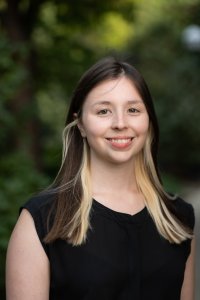Presented By: Weinberg Institute for Cognitive Science
Cognitive Science Seminar Series
Danielle Burgess (PhD Candidate, Department of Linguistics)

The Cognitive Science Seminar Series is an informal gathering of graduate students and faculty from multiple departments with an interest in presenting and discussing cognitive science topics. The seminars are held weekly throughout the academic year on Tuesdays from 2:30-3:50 PM in Weiser 955.
______
Title
nvestigating the Source of Neg-First Biases in Typology and Acquisition
Abstract
The tendency for negation to appear early in the sentence, dubbed the “Neg-First principle” by Horn (1989:452), has been observed in the domains of typology, language contact, and language acquisition. While scholars have speculated about the source and universality of the Neg-First principle based on such evidence, these hypotheses have not been widely tested or corroborated using experimental methods. In this talk, I will report two artificial language learning experiments which investigate the effect of language experience on the behavioral bias to produce preverbal negation among speakers of English and Japanese, as well as the hypothesis that the Neg-First principle is driven by factors of audience design in communication. While English speakers show a preference to produce preverbal negation even in the absence of communication, Japanese speakers do not, challenging the idea of a universal preference for preverbal negation in acquisition as a plausible candidate for shaping linguistic typology. Though one possibility is that the cross-linguistic prevalence of preverbal negation results from historical forces rather than pressures on learning and use, more nuanced explanations which maintain the role of biases which are present independent of language experience remain to be explored.
______
Title
nvestigating the Source of Neg-First Biases in Typology and Acquisition
Abstract
The tendency for negation to appear early in the sentence, dubbed the “Neg-First principle” by Horn (1989:452), has been observed in the domains of typology, language contact, and language acquisition. While scholars have speculated about the source and universality of the Neg-First principle based on such evidence, these hypotheses have not been widely tested or corroborated using experimental methods. In this talk, I will report two artificial language learning experiments which investigate the effect of language experience on the behavioral bias to produce preverbal negation among speakers of English and Japanese, as well as the hypothesis that the Neg-First principle is driven by factors of audience design in communication. While English speakers show a preference to produce preverbal negation even in the absence of communication, Japanese speakers do not, challenging the idea of a universal preference for preverbal negation in acquisition as a plausible candidate for shaping linguistic typology. Though one possibility is that the cross-linguistic prevalence of preverbal negation results from historical forces rather than pressures on learning and use, more nuanced explanations which maintain the role of biases which are present independent of language experience remain to be explored.